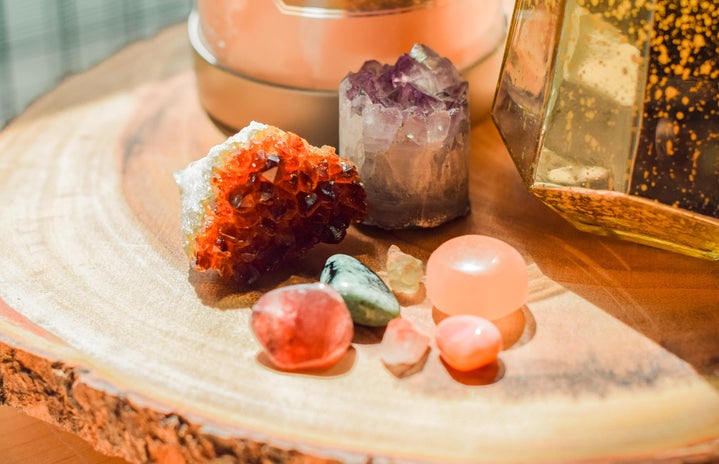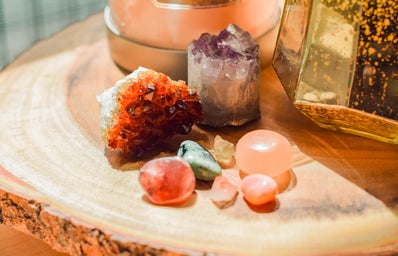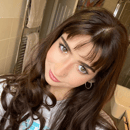In the age of mass production, rapidly developing technology and Covid-19, the world feels like an incredibly unsettling place. Even though technology has provided us with so many incredible things, such as outstanding medical advancements and ways to communicate with people all across the globe, it is no lie that we’ve never been so disconnected from one another, and, arguably, ourselves – I am no exception! Being addicted to our phones is a very real and pressing issue we face in our modern society, yet it is almost inescapable – especially with school, work and other in-person events now being online.
In terms of spirituality though, social media has almost revived its practice. TikTok, for example, has spread the popularity and awareness of spiritual practices across the globe. Look through the ‘Witchtok’ hashtag and you’ll find a plethora of videos about crystals, divination, manifestation and more. Although TikTok can be a valuable resource when used correctly, there is an incredible amount of misinformation amongst the topic of spirituality which can lead to cultural appropriation. Cultural appropriation is rife, with non-indigenous people burning sacred white sage in the Native ritual of ‘smudging’, fashion brands using the Nazar (or Evil Eye) as a trendy symbol and ‘Baby Witches’ making honey jars, a closed practice of Hoodoo. Many people who partake in these activities haven’t got a clue that they are engaging with cultural appropriation. Nevertheless, it is your responsibility to do the research before assuming your entitlement to partake in a particular practice or waiting for someone who is part of the culture to call you out (and scrolling through your ‘for you page’ and watching solely white creators doesn’t count as researching spiritual practices).
so, what does spirituality mean to me?
If you ask different people what spirituality means to them, the likelihood that every single one of them will provide you with a different answer is high. Spirituality is catered to every individual, varying between cultures, religions and personal beliefs. By definition, spirituality is generally considered to be a connection to something bigger than ourselves and finding meaning outside the bounds of our physical realities. To me, spirituality is a way of life, a way of viewing things, and a way of honouring the natural world around us all. Spirituality is balance: balance between recognising yourself as an individual, as a part of the collective and the wider universe.
I have always considered myself spiritual rather than religious, never conforming to a specific religion but believing there is something more than our perceivable surroundings. From a young age, I believed that our lives were fully mapped out for us. I have owned crystals for years, but I didn’t understand how to properly use them to my advantage. In a bid to further my understanding, without realising the subsequent impact it would have on my life, I started by doing something simple: I bought myself a notebook and researched the properties, meanings and benefits of the crystals I owned already and made notes for each individual crystal. I also researched how to cleanse and charge the crystals, something I was unaware of. This kickstarted my journey into spirituality. Crystals turned into more crystals; more crystals turned into books on crystal healing, herbal healing and tuning into the lunar cycles; books turned into beginning to practice Kundalini yoga, and yoga turned into reading oracle cards, starting only with myself and then for family and close friends. Summarising how this has impacted my life in a page of words cannot do it justice; dedicating myself to spirituality genuinely changed my life in ways I didn’t even anticipate. I’ve always struggled with anxiety which was heightened by of the pandemic. By the third lockdown in January 2021, only three months into my first year at Bristol University, I felt lost, uncertain and lacking in purpose – until I began incorporating spirituality into my life and dedicating myself to spiritual practices.
I had a strange relationship with meditation and mindfulness before beginning my spiritual journey. If you have ever sought out professional help for your mental health, you have probably heard the belittling sentences ‘you should download headspace’ and ‘have you looked into mindfulness?’. I found it really hard to meditate because of this, until I stumbled across a morning meditation video and started doing it as soon as I woke up every day. I began to notice a huge difference in my daily life between the days I meditated and the days that I didn’t. I felt more present, calm and aware yet in control of my emotions. Meditation has so many incredible benefits such as stress reduction, emotional awareness, increased attention span and controlling anxiety. It allows you to create a peaceful space within yourself that you can return to any time in the day; once you begin to view it in this manner it becomes an incredible, mental tool to make use of if you feel overwhelmed or experience any negative emotions throughout the day.
My favourite morning meditation is a guided meditation by ‘Boho Beautiful Yoga’ on YouTube. Meditation doesn’t have to only be done in the morning, though. I also love doing meditations with the lunar cycles, specifically the moon meditations by ‘Alina Alive’ on YouTube. YouTube is an amazing tool to find meditations for whatever you feel you need or want in that moment, with you being able to decide how long you feel you are able to dedicate to it and exactly the kind of meditation you are looking for, whether that be more spiritual or more specific to emotions or situations.
Spiritual practices, such as reading your own oracle cards, connecting with crystals, doing shadow work and meditating, to name only a few, lead to questions like: ‘what can I do to react better in this situation?’, ‘Is this in my control or out of my control?’, ‘Am I being the best version of myself right now?’ And, if that best version of yourself is sitting bundled up in blankets watching a film with a hot chocolate, that’s completely fine too. Part of my spiritual journey was realising I don’t have to be ‘switched on’ the entire time. Looking inward forced me to reflect on my life to work out which behaviours benefited me and how much I could control the way I perceive and experience the world around me by my own actions and thought patterns.
By all means I’m not claiming to not struggle at all anymore, I’m still human and still experience ups, downs and everything in-between. Spirituality is not the be-all and end-all to overcoming personal issues, it is simple a stepping stone to a better, more open-minded and peaceful way of life. Some days practicing these things just isn’t possible, with balancing university, a job, a far busier social life and the emotions of all three. This is the beauty of incorporating spiritual practices, beliefs and mindsets into your wider lifestyle; as long as you’re respectful towards the origins of the practices you partake in, do your research and ensure you don’t participate in closed practices, you don’t have to be the ‘perfect’ spiritual practitioner – I’m certainly not, but I have so much to thank spirituality for already.


